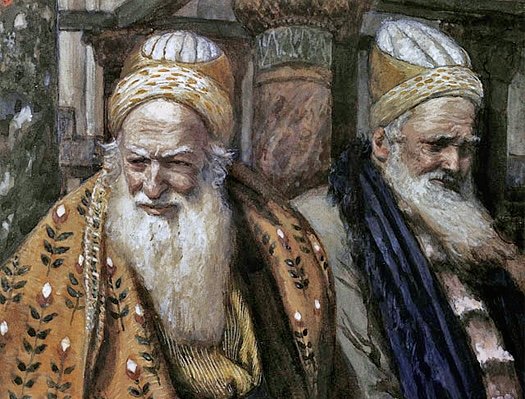In ancient times, repetition of certain themes was an important way of communicating essential truths. Today I’d like to trace an important theme through the book of Matthew. We’ll focus on stories in Matthew 9, 12, and 13, but if other references are given without mentioning a book, you can assume the reference is still in Matthew.
I’ve broken these thoughts into a three-part series, but I’ve published all three parts at the same time. So, if you’re gung-ho and want to read everything all at once, you can. If you want to take time to absorb each part over a couple of days, you can go at your own pace.
At each point, we’ll read a little bit of the story and pull out meaning specific to each account. Then at the end, we’ll show how each piece has tied into the overall theme.
Until now:
Let’s continue!
3. SERVING THE SABBATH

After Jesus is finished teaching, He goes on a walk with His disciples.
At that time Jesus went through the grain fields on the Sabbath, and His disciples became hungry and began to pick the heads of grain and eat.
Now when the Pharisees saw this, they said to Him, “Look, Your disciples are doing what is not lawful to do on a Sabbath!”
But He said to them, “Have you not read what David did when he became hungry, he and his companions— how he entered the house of God, and they ate the consecrated bread, which was not lawful for him to eat nor for those with him, but for the priests alone?
“Or have you not read in the Law that on the Sabbath the priests in the temple violate the Sabbath, and yet are innocent? But I say to you that something greater than the temple is here. But if you had known what this means: ‘I desire compassion, rather than sacrifice,’ you would not have condemned the innocent.”
(Matthew 12:1–7)
In this story, the Pharisees object to the disciples eating grain from the fields on the Sabbath (because they are “harvesting” and therefore working when they are supposed to be resting). To understand this passage more deeply, let’s turn our attention again to the blue text.
In this story, Jesus once more says, “I desire compassion, rather than sacrifice.”
(On the surface, this line seems to be disconnected with the one before. But—having lived in Japan and heard the way they use Scriptures here, connecting them in ways that sometimes don’t make sense to me—I’m more open than ever to the idea that sometimes things that I perceive as “disconnected” are really joined together through a string of logic that’s foreign to my own.)
Like me, you may have interpreted this line as Jesus somehow exhorting the Pharisees to have compassion on the needs of the disciples and, by extension, on the people of Israel. And that may be one layer.
But there’s another layer. Let’s look at the elements:
compassion (inner) - heart
sacrifice (outer) - deeds
The Pharisees—who only understand the world based on things they can see—think their sacrifices make them holy. So they have difficulty answering Jesus’ challenges. They don’t understand the principles beneath the Law (in this case, that the Sabbath was made for human beings and not the other way around).
They don’t understand that sin flows from the heart (15:15–20).
They swear by the surface—the gold of the temple (23:16–22) rather than the temple.
They give tithes but neglect the heart of the law (23:23–24). They clean the outside of the cup but neglect the inside (23:25–26), they are whitewashed tombs (23:27–28) full of uncleanness. They decorate the tombs of the prophets and kill the prophets (23:29–35).
It’s noteworthy that this is the second time Matthew has quoted this “compassion not sacrifice” line from the prophets.
Remember, the first time was when Matthew himself was called. For him, that was the start of his story with Jesus. Whatever was said or done at that point was of utmost importance.
“I desire compassion, rather than sacrifice.”
This verse was extremely dear to Matthew’s heart, so he wouldn’t have re-quoted it lightly.
It points to a major theme running through much of Matthew:
understanding the inner/unseen reality and not just the surface
In light of this, let’s go back to look at that first time, when Matthew was called.
When challenged about eating with tax collectors and sinners, Jesus said:
“It is not those who are healthy who need a physician, but those who are sick. Now go and learn what this means: ‘I desire compassion, rather than sacrifice,’ for I did not come to call the righteous, but sinners.”
Of course, we know that we’re all sinners. But here Jesus is meeting the Pharisees on their level. He’s looking at the outside rather than the inside. Essentially, He’s speaking to them on their terms.
This is quite a gentle approach. [1]
Matthew, too, is gentle with the Pharisees. After the account of his own calling, the very next vignette Matthew shares is about John the Baptist’s disciples coming to Jesus and asking, “Why do we and the Pharisees fast, but Your disciples do not fast?” [2]
It’s as if Matthew is telling us, “It’s not just the Pharisees who looked at the outside without understanding these greater, heart-level things. Everyone did it.”
And Jesus, in His gentleness, explains matters using a parable (e.g., in terms of the bridegroom’s attendants not being about to mourn while he is with them). [3]
“Why are you crying, Mummy?”
“Because I’m sad.”
That’s Jesus’ tenderness with those of us who genuinely want to learn, whose hearts are not closed and hardened by pride. (6:1–5)
Lord Jesus, please enable me to understand the principles behind the things You have taught. Please help me not to only focus on the surface—on concrete rules that soothe me with their lack of ambiguity. Please let me not lull myself into thinking that flexible rules mean flexible principles. Please help me to understand what’s negotiable and what’s not. Please show me how to love people the way You love them, to meet them where they are, and to draw them into Your presence. Please enable me to be humble and teachable, to not cling so tightly to my own perspective that I blind myself to the dazzling truths You want to impart to me. Please, Holy Spirit, fill me with Yourself, and lead me into Your depths of mercy and of grace! In Jesus’ name I pray, amen.
NOTES
[1] Incidentally, Jesus' tone gets harsher the longer the Pharisees go on in their stubbornly childish outlook.
[2] Matthew 9:14, NASB.
[3] See Matthew 9:15.










